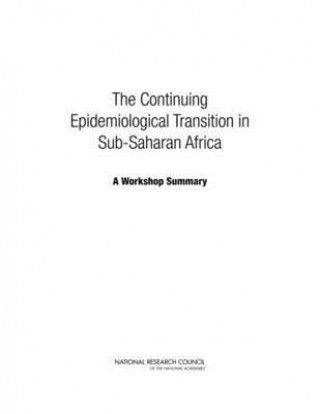
Kód: 04579459
Continuing Epidemiological Transition in Sub-Saharan Africa
Autor Committee on Population, Division of Behavioral and Social Sciences and Education, National Research Council
Among the poorest and least developed regions in the world, sub-Saharan Africa has long faced a heavy burden of disease, with malaria, tuberculosis, and, more recently, HIV being among the most prominent contributors to that burde ... celý popis
- Jazyk:
 Angličtina
Angličtina - Vazba: Brožovaná
- Počet stran: 47
Nakladatelství: National Academies Press, 2012
- Více informací o knize

999 Kč
Dostupnost:
50 % šance Máme informaci, že by titul mohl být dostupný. Na základě vaší objednávky se ho pokusíme do 6 týdnů zajistit.
Máme informaci, že by titul mohl být dostupný. Na základě vaší objednávky se ho pokusíme do 6 týdnů zajistit.Prohledáme celý svět
Mohlo by se vám také líbit
-

Health, Safety, and Nutrition Activities A to Z
1754 Kč -

Choosing and Using Astronomical Eyepieces
1576 Kč -

Amethyst Eyes: The Legend Come to Life
337 Kč -

Slavnost Johna Saturnalla
334 Kč -

Club Prisma Elemental A2 Libro del profesor + CD
672 Kč -

Der Schutz des Bodens vor Schadstoffeintrag.
2112 Kč -

Ah Gönlüm
550 Kč
Darujte tuto knihu ještě dnes
- Objednejte knihu a zvolte Zaslat jako dárek.
- Obratem obdržíte darovací poukaz na knihu, který můžete ihned předat obdarovanému.
- Knihu zašleme na adresu obdarovaného, o nic se nestaráte.
Informovat o naskladnění knihy
Zadejte do formuláře e-mailovou adresu a jakmile knihu naskladníme, zašleme vám o tom zprávu. Pohlídáme vše za vás.
Více informací o knize Continuing Epidemiological Transition in Sub-Saharan Africa
Nákupem získáte 100 bodů
 Anotace knihy
Anotace knihy
Among the poorest and least developed regions in the world, sub-Saharan Africa has long faced a heavy burden of disease, with malaria, tuberculosis, and, more recently, HIV being among the most prominent contributors to that burden. Yet in most parts of Africa-and especially in those areas with the greatest health care needs-the data available to health planners to better understand and address these problems are extremely limited. The vast majority of Africans are born and will die without being recorded in any document or spearing in official statistics. With few exceptions, African countries have no civil registration systems in place and hence are unable to continuously generate vital statistics or to provide systematic information on patterns of cause of death, relying instead on periodic household-level surveys or intense and continuous monitoring of small demographic surveillance sites to provide a partial epidemiological and demographic profile of the population. In 1991 the Committee on Population of the National Academy of Sciences organized a workshop on the epidemiological transition in developing countries. The workshop brought together medical experts, epidemiologists, demographers, and other social scientists involved in research on the epidemiological transition in developing countries to discuss the nature of the ongoing transition, identify the most important contributors to the overall burden of disease, and discuss how such information could be used to assist policy makers in those countries to establish priorities with respect to the prevention and management of the main causes of ill health. This report summarizes the presentations and discussions from a workshop convened in October 2011 that featured invited speakers on the topic of epidemiological transition in sub-Saharan Africa. The workshop was organized by a National Research Council panel of experts in various aspects of the study of epidemiological transition and of sub-Saharan data sources. The Continuing Epidemiological Transition in Sub-Saharan Africa serves as a factual summary of what occurred at the workshop in October 2011.
 Parametry knihy
Parametry knihy
Zařazení knihy Knihy v angličtině Society & social sciences Sociology & anthropology Sociology
999 Kč
- Plný název: Continuing Epidemiological Transition in Sub-Saharan Africa
- Podnázev: A Workshop Summary
- Autor: Committee on Population, Division of Behavioral and Social Sciences and Education, National Research Council
- Jazyk:
 Angličtina
Angličtina - Vazba: Brožovaná
- Počet stran: 47
- EAN: 9780309266482
- ISBN: 0309266483
- ID: 04579459
- Nakladatelství: National Academies Press
- Hmotnost: 227 g
- Rozměry: 279 × 216 × 5 mm
- Datum vydání: 01. November 2012
Oblíbené z jiného soudku
-

Sex at Dawn
329 Kč -

Death and the Afterlife
490 Kč -

Cartoon Guide to Statistics
463 Kč -

Why Love Hurts - A Sociological Explanation
462 Kč -

Past Mortems
249 Kč -

Basic and Advanced Focus Groups
1076 Kč -

Fair Play Deck
515 Kč -

Intimate Communion
341 Kč -

Tragedy and Hope
1124 Kč -

Small Is Beautiful
276 Kč -

More Than Two
616 Kč -

Regretting Motherhood
350 Kč -

Social Intelligence
378 Kč -

True Believer
362 Kč -

Art of Community: Seven Principles for Belonging
485 Kč -

NINETY PERCENT OF EVERYTHING
400 Kč -

Reassembling the Social
1056 Kč -

Family and Civilization
584 Kč -

Book of Tea
249 Kč -

Building and Dwelling
433 Kč -

Constructing Grounded Theory
1321 Kč -

Surrendered Wife
276 Kč -

Of Woman Born
373 Kč -

Cruel Optimism
782 Kč -

Death and the Afterlife
914 Kč -

What Kinship Is-And Is Not
626 Kč -

Social History of Sexual Relations in Iran
1396 Kč -

Post-Adoption Blues
446 Kč -

Dissecting the Danchi
3672 Kč -

Birth Of A Mother
556 Kč -

New Old Fashioned Ways
470 Kč -

Secret Meaning of Money - How to Prevent Financial Problems from Destroying Our Most Intimate Relationships
963 Kč -

Death Tourism
1004 Kč -

Platform Society
1003 Kč -

Braving the Wilderness
247 Kč -

Eroticism
302 Kč -

Marriage, a History
465 Kč -

Bushido the Soul of Japan
289 Kč -

Intercourse
383 Kč -

Ideology and Utopia
462 Kč -

Population Control
356 Kč -

Class Ceiling
324 Kč -

Chrysanthemum and the Sword
435 Kč -

Smoke Gets in Your Eyes
302 Kč -

Sociology: A Very Short Introduction
249 Kč -

Being Mortal
323 Kč -

Theory of the Leisure Class
302 Kč -

Social Construction of Reality
302 Kč -

Bushido: The Soul Of Japan
435 Kč
Osobní odběr Praha, Brno a 12903 dalších
Copyright ©2008-24 nejlevnejsi-knihy.cz Všechna práva vyhrazenaSoukromíCookies


 Vrácení do měsíce
Vrácení do měsíce 571 999 099 (8-15.30h)
571 999 099 (8-15.30h)